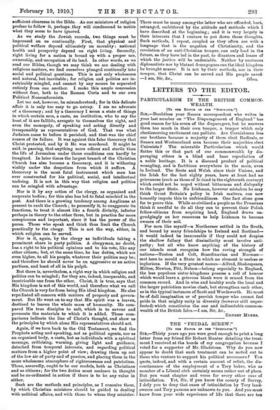LETTERS TO THE EDITOR.
PARTICULARISM IN THE BRITISH COMMON- WEALTH.
rro IMF EDITOR or THR "SFECTLTOR.1 Sin,—Doubtless your Sussex correspondent who writes in your last number on " The Disparagement of England" has good reason for his scorn of the disparagers, but he answers them too much in their own temper, a temper which only electioneering excitement can palliate. Are Cornishmen less our brothers because a majority of them elect Radicals, or Sussex and Westmorland men because their majorities elect Unionists P The miserable Particularism which would flatter this or that part of our commonwealth by dis- paraging others is a blind and base repudiation of a noble heritage. It is a diseased product of political wrangling, and is factitious everywhere in the main, even in Ireland. The Scots and Welsh since their Unions, and the Irish for the last eighty years, have at least had no grievances (such as those of Ireland in the eighteenth century) which could not be urged without bitterness and disloyalty to the larger State. No Irishman, however mistaken he may think Great Britain's policy in Irish matters, can now honestly impute this to unfriendliness. One fact alone goes far to prove this. While so civilised a people as the Prussians think it needful to do all they can to prevent their Polish fellow-citizens from acquiring land, England draws un- grudgingly on her resources to help Irishmen to become owners of their soil.
For men like myself—a Northerner settled in the South, and bound by many friendships to Ireland and Scotland— it would indeed be inexcusable if they could not despise the shallow fallary that dissimilarity must involve anti- pathy; but all who know anything of the history of our islands must recognise how the roving strength of nations—Teuton and Celt, Scandinavian and Norman— met here to mould a State in which no element is useless or inglorious. If the very greatest names—Alfred, Shakespeare, Milton, Newton, Pitt, Nelson—belong especially to England, the less populous sister-kingdoms possess a roll of honour which would leave a grievous blank were it erased from the common record. And in wise and healthy souls the local and the larger patriotism nowise clash, but strengthen each other, as in the typical instances of Scott and Wordsworth. He must be of dull imagination or of peevish temper who cannot feel pride in that mighty unity in diversity (however still unper- fected) which constitutes the one and indissoluble common- wealth of the British Isles.—I am, Sir, &c., EENEST Mynas.








































 Previous page
Previous page